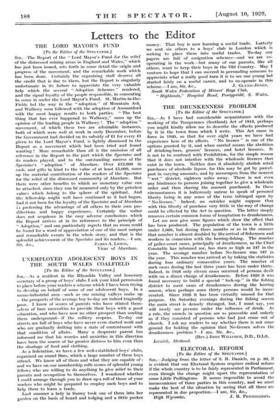THE DRUNKENNESS PROBLEM
[To the Editor of the SPECTATOR.] Sm,—As I have had considerable acquaintance with the working of the Temperance (Scotland) Act of 1913, perhaps you might kindly allow me to describe the effects produced by it in the town from which I write. This Act came in force in 1920, so that for over eight years we have had experience here of its effects. "No licence" is one of the options granted by it, and when carried means the abolition of drinking-bars, grocers' licences, and hotel licences. It is not to be confused with Prohibition, for the simple reason that it does not interfere with the wholesale licences that exist in the town. Neither does it absolutely abolish retail purchases of alcoholic liquor, for this may be got by pareel- post in varying amounts, and by messengers from the nearest " wet " district, eighteen miles away. .There is not even any hindrance to persons joining together to give a wholesale order and then sharing the amount purchased. In these circumstances it is ludicrously untrue to speak of personal liberty being in any sense of the term infringed upon by "No-licence." Indeed, an outsider might suppose that with this liberty of purchase very little in the way of change could be effected by the Act in question. The latter simply removes certain common forms of temptation to drunkenness.
Let me now give some figures which show the _effect that has been produced. The population of the town is a little under 5,000, but during three months or so in the summer that number is almost doubled by the arrival of fishermen and workers in connexion with the herring-fishing. The number
police-court cases, principally of drunkenness, as the Chief Constable has informed me, has risen as high as 247 in the year. The average number before No-licence was 187 in the year. This number was arrived at by taking the statistics during four ordinary consecutive years. The number of such cases during the last three years has been under thirty. Indeed, in 1928 only eleven cases occurred of persons dealt with on a direct charge of drunkenness. Before 1920 it was found necessary to build a special " lock-up " in the fishing district to meet cases of drunkenness during the herring season, when perhaps some thirty persons would be incar- cerated. Since 1920 it has been virtually unused for that purpose. On Saturday evenings during the fishing season the main street is densely thronged, but, I must say, you will rarely see persons under the influence of drink. As a rule, the crowds iii question are as peaceable and orderly as if they consisted of persons who had just come out of church: I ask my readers to say whether there is not some ground for holding the opinion that No-licence solves the drunkenness problem ?—I am, Sir, &c.,
(Rev.) JOIIN Wimacoor, D.D., D.Lit. Lerzoick, Shetland.
































 Previous page
Previous page